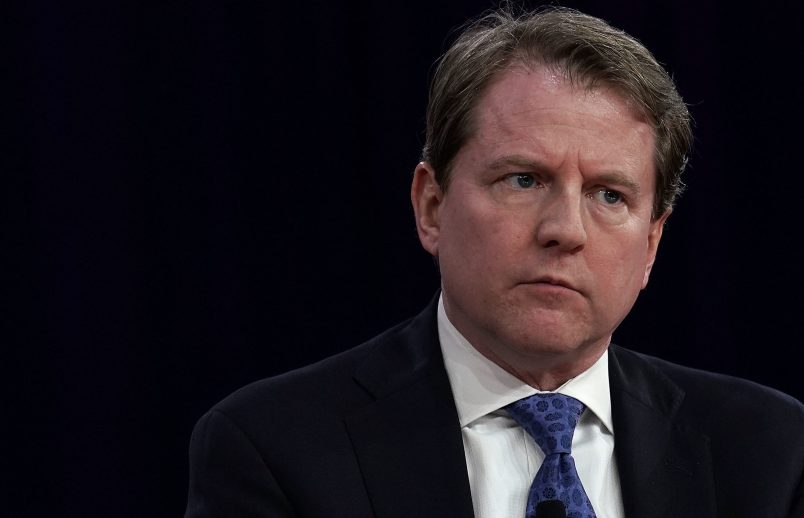The Justice Department on Monday issued a legal opinion claiming that Congress could not compel former White House Counsel Don McGahn to testify about special counsel Robert Mueller’s report.
The opinion was released not long after reports that the White House was planning to instruct McGahn to not comply with a House subpoena that he testify at a Judiciary Committee hearing Tuesday.
The White House has already instructed McGahn to not turn over certain documents that were subpoenaed by House Democrats, as they delve into the findings of special counsel Robert Mueller’s investigation.
“Congress may not constitutionally compel the President’s senior advisors to testify about their official duties,” the Justice Department’s opinion said. “This testimonial immunity is rooted in the constitutional separation of powers and derives from the President’s independence from Congress.”
Minutes after the Department released its opinion, White House spokesperson Sarah Sanders issued a statement that noted the new DOJ opinion that “the former Counsel to the President cannot be forced to give such testimony” and that “McGahn has been been directed to act accordingly.”
“This action has been taken in order to ensure that future Presidents can effectively execute the responsibilities of the Office of the Presidency,” Sanders claimed.
Current White House Counsel Pat Cipollone also sent House Judiciary Chairman Jerry Nadler a letter claiming that there “is no question that the position of Counsel to the President falls within the scope of the immunity.”
Nadler responded in a statement Monday evening saying that the committee will still convene for McGahn’s testimony on Tuesday morning and that they expect McGahn to appear.
“This move is just the latest act of obstruction from the White House that includes its blanket refusal to cooperate with this Committee. It is also the latest example of this Administration’s disdain for law,” Nadler said. “It is absurd for President Trump to claim privilege as to this witness’s testimony when that testimony was already described publicly in the Mueller Report. Even more ridiculous is the extension of the privilege to cover events before and after Mr. McGahn’s service in the White House.”
Preventing McGahn’s cooperation with the House is one of several fronts of an aggressive war Trump has launched to resist efforts of oversight by House Democrats.
Trump has also sought to block subpoenas House Democrats issued to his accounting firm and banks for various financial records. His private attorneys have argued in court that Congress has no authority to launch investigations into whether Trump has committed crimes, claiming that sort of “law enforcement” investigation is solely the prerogative of the executive branch.
McGahn was a key witness in Mueller’s probe, particularly into his investigation into whether the President obstructed justice. McGahn was directly implicated in several major episodes that Mueller implied were obstructive in nature — including Trump’s orders that McGahn see to it that Mueller was fired, and demands by Trump that McGahn falsely deny that the President ordered Mueller be fired.
In a letter to Nadler earlier this month explaining McGahn’s refusal to turn over the subpoenaed documents, his attorney said that McGahn “continues to owe certain duties and obligations to the President which he is not free to disregard.”
The Justice Department opinion released Monday argued that the testimonial immunity still applied even after McGahn left the White House. It also said that the cooperation of Trump’s aides in Mueller’s investigation and the subsequent release of Mueller’s report did not amount to a waiver of executive privilege.
The opinion also addressed specifically treat of inherent contempt — an arcane authority of Congress to fine or detain subpoena defiers that has become the topic of recent discussion on the Hill.
“We similarly believe that Congress could not lawfully exercise any inherent contempt authority against Mr. McGahn for asserting immunity,” the opinion said. “The constitutional separation of powers bars Congress from exercising its inherent contempt power in the face of a presidential assertion of executive privilege.”







“Rule of law”
“Law and order”
“Nothing to hide”
Retired and hanging in the GOP Convention rafters.
More obstruction. Lock the motherfu€k€r up!
There’s only one way around all this obstruction…
It is now all obstruction all the time.
“continues to owe certain duties and obligations to the President which he is not free to disregard.”
For example?